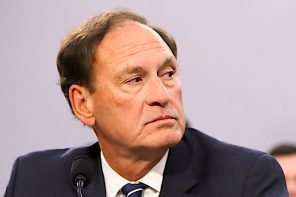On November 2, 1984, Velma Barfield became the first woman to be executed in the U.S. since 1962, and the first to be executed in the State of North Carolina after the nationwide moratorium on the death penalty was lifted in 1976. She was 52 years old.
For those of us who had worked on her clemency petition, it was a devastating blow. Then-Governor Jim Hunt was running for a seat in the US Senate against arch-conservative Jesse Helms. Inexplicably, Barfield’s clemency hearing had been scheduled just six days prior to the election. Helms made it a campaign issue, of course, suggesting that, were the Governor to grant Barfield clemency, then his true liberal stripes would be clear to everyone.
By contrast, even the staff at the Women’s Prison in Raleigh had written in support of Barfield’s petition; her work in counseling and religious instruction behind bars even earned her praise from the likes of Billy Graham. Everyone agreed there was no stronger clemency case on death row in the state.
But the governor’s peremptory meeting with those who presented the clemency petition lasted little more than half an hour, and it was clear to us that his mind was already made up.
The Barfield execution came back to life in the following spring, in the form of a letter from an eloquent if quirky citizen of the State of North Carolina; one who was opposed to the death penalty for religious reasons. He had calculated the approximate cost of executing Velma Barfield—not just the lethal injection, but the years of legal wrangling as well. According to his calculations, and given the current population of the state, exactly one cent of his own tax payment had been used to execute Velma Barfield—so he enclosed a check to the North Carolina State Tax Commissioner for 1984, in which he had withheld that suspect penny.
As you might imagine, the state took a different view, taking issue especially with this self-imposed tax break. Their point was that you do not get to pick and choose which state services you are willing to pay for, not even for religious reasons.
Especially not for religious reasons, since there are so very many of them.
The cash-strapped State of North Carolina spent a lot more than one cent to get that penny back. As they should have done, though this citizen’s symbolic point had been made quite eloquently by then.
No Picking and Choosing
I have returned many times to that story as I have listened to Catholic churches, Catholic institutions from hospitals to universities, and two Catholic presidential candidates all insist on what that poor guy from North Carolina was asking for: a religious exemption from paying for state services to which he was opposed on moral and religious grounds.
The state’s answer was simple in the spring of 1985: you don’t get to pick and choose the services you pay for, regardless of the reason.
This case raises an issue of considerably sharper interest, I think, given the Catholic Church’s consistent opposition to the death penalty, to preemptive wars (especially those conducted primarily through interdiction), to abortion, and now, we are told, to contraception.
So why has there never been a similar stink about Catholic exemptions from death penalty provisions? Why no such tax withholding for the wars in Iraq and Afghanistan? And why is the state bending over backwards to accommodate these religious sentiments about contraception, rather than some others?
One explanation might be historical: what a difference a generation makes. After thirty years of hammering away at the need for the secular state to accommodate religious objections to virtually every damn thing it does, the state is backpedaling and the Church is on the offensive. From 1979 to 2012, politicized Christianity isn’t just taking its place at the table, it’s trying to rewrite the menu. Anti-feminism has loomed large in that effort.
Clerical Hysteria
Which brings me to a second explanation, one that is not historical so much as it is hysterical. I mean that quite literally.
Hysteria is a term that derives from the Greek word for the uterus, and this is indeed a battle over women’s uteruses: over what goes in them and what stays out. The death penalty and international warfare simply do not energize the sex-obsessed American electorate the way that women’s sexual autonomy does.
What is the problem with contraception? It enables women to be sexually active without paying the price, as it were; the massive biological and sociological and personal costs that may come with unwanted pregnancy and bringing such pregnancies to term.
The end of the sexual act is procreation, from the Catholic perspective; sexual pleasure or expressions of love and affection are not legitimate ends if they are detached from the procreative intention. Contraception enacts that detachment. Moreover, by separating the sexual act from the intention of conception, contraception encourages women’s sexual promiscuity—so goes the Catholic thinking.
Rush Limbaugh’s tirade to this effect, for all of its bile, well describes what is at stake in this debate, for some people. The fact that men’s sexual promiscuity does not register as a concern of equal standing for such persons is itself quite telling.
To my eye, the most significant thing that has happened between 1979 and 2012 has been the significant and at times studied erosion of feminist achievements in mandatory, state-sanctioned equality. I’m talking about the basics here, the principal First and Second Wave achievements:
political equality, symbolized by a woman’s right to vote and to hold political office; and
economic equality, symbolized by the ideal, if not the reality, of equal pay for equal work.
But when the sexual equality of men and women is at issue—not sexual sameness, let’s be clear about that, just sexual equality—then the howling starts, and churches start withholding their money and support.
The debate is, in this sense, hysterical. And there’s a pretty simple solution to it. If you want to run as a Catholic hospital or a Catholic university and not offer the full array of health care services to women as mandated by the state, then don’t implicate yourself in any federal or state funding. Not one penny.
All the World a Stage
Now, I admit that this argument must seem overdrawn at first glance. There seems to be a fundamental difference between a citizen and/or organization withholding taxes for state services with which they do not wish to be identified, and a citizen and/or organization being asked to provide those services themselves.
The problem is that this creates a false distinction between the state as an actor and people as actors. State services are, all of them, provided by organizations and by people. Catholic institutions are claiming an exemption from the obligation to provide such services because they are religiously opposed to them. They are engaging in a selective opt-out, just like the guy from North Carolina.
I am not convinced that any of the charities, hospitals or universities involved in this debate are truly independent religious institutions that receive no federal dollars. An institution’s tax exempt status alone casts that into grave doubt. And these institutions seem not to recognize that one way for the state to insist on its way, and for them to gain their administrative freedom, would be to abrogate that curious tax exemption for an institution as wealthy as the Catholic Church in a time of real fiscal crisis. But clearly, this would lend itself to the very Big Brother vision of the federal government that created this controversy in the first place.
Instead, President Obama, ever the patient compromiser, attempted to create a new distinction, one of limited practical usefulness but great symbolic value, suggesting that insurance providers would be paying for these services, not the institutions themselves.
And that is when the U.S. Conference of Catholic Bishops, sensing weakness, intensified its position, indicating that it is not just opposed to being asked to pay for such services, but that any of the Catholics for whom they speak would be asked to provide them. This is fascinating; the Catholic Bishops now appear to be claiming the right to opt out of any programs with which they disagree. Here is their response to the president’s proposed compromise, in their words:
[this] continues to involve needless government intrusion in the internal governance of religious institutions, and to threaten government coercion of religious people and groups to violate their most deeply held convictions.
It’s not just about the money; it’s about Big Brother. And so:
We will therefore continue—with no less vigor, no less sense of urgency—our efforts to correct this problem through the other two branches of government.
So the problem is not with government per se, just with the president. This is why it is so rhetorically critical for them to refer to “Obamacare” rather than the “Patient Protection and Affordable Care Act,” thereby conveniently forgetting that this was a law passed by the Legislative branch of the US Government, not an Executive Order.
Now, it is perfectly within the Bishops’ rights to petition the US Congress to change a law, or even to vacate it and to start over, as it is their right to question the constitutionality of a law in the courts.
But that is why I began with the story from North Carolina. The question that should be asked is why the US Catholic Bishops are exerting so much energy and money and time on the matter of contraception, with no similarly public cries of outrage against the death penalty, state-sponsored torture, or the two preemptive wars in which the U.S. has involved itself for fully a decade.
Clearly there is a lot more to this debate than the First Amendment. It has to do with one of the most powerful patriarchal religious organizations in the world—be sure to recall that the bishops are all men, every last one of them—placing itself squarely in opposition to women’s sexual equality and autonomy.




